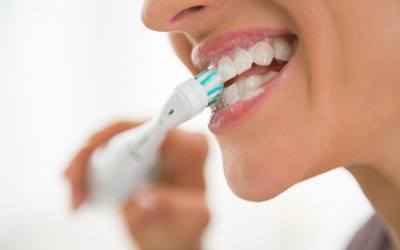Dental Implants — Forest Park, OH
The Gold Standard of Tooth Replacement

Over the last several decades, dental implants have risen to become the most popular treatment choice for patients dealing with tooth loss in Forest Park. Our implant dentists partner with local oral surgeons to help restore smiles utilizing this cutting-edge technology, allowing them to enjoy a grin that not only looks natural, but also feels lifelike. With boosted confidence, improved eating and speaking abilities, and even more benefits, patients who invest in dental implants find that their investment in their smile is priceless. Call our office today to schedule a consultation with our team!
Why Choose Kemper Meadow Family Dentistry for Dental Implants?
- We Partner with Local Expert Oral Surgeons
- Advanced Planning with 3D Cone Beam CT Scanner
- We Work with CareCredit & Lending Point
What are Dental Implants?

Dental implants can be thought of as artificial tooth roots, similar to screws in shape. Once they’re secured in the jawbone, the implants bond with the natural bone structure through a process called osseointegration. This makes them a strong, sturdy foundation to support one or more restorations, including crowns, bridges, or dentures.
Dentistry has been utilizing modern dental implants successfully for years. They’re the most durable supports available for replacement teeth and boast an impressive 95% treatment success rate.
The 4-Step Dental Implant Process

Restoring your smile with dental implants is an outpatient process performed in several stages, allowing for time to heal between procedures. There are multiple steps involved in placing a dental implant, including:
- Removal of the damaged tooth or teeth
- Preparing the jawbone (grafting), if needed
- Placing the dental implant
- Bone integration and healing
- Placing the abutment
- Placing the artificial tooth or teeth
The whole process could take several months from beginning to end, depending on whether you require preparatory treatments and based on your personalized treatment timeline.
Initial Consultation

Since dental implants could require several surgical procedures, you will need to have a comprehensive evaluation to prepare for the entire process, which includes:
- Thorough dental exam: You might require 3D images and X-rays for making models of your jaw and teeth.
- Medical history review: We will ask about any health conditions and medicines you’re currently taking, including over-the-counter and prescription drugs and supplements. If you have orthopedic implants or certain heart conditions, we may prescribe you antibiotics before your procedure to help prevent infection.
- Plan of treatment: We’ll tailor your treatment plan to your specific situation, taking various factors into account like the condition of your jawbone, how many teeth you need replaced, and your remaining teeth.
- Sedation options: If necessary, you may invest in dental sedation to have a more positive experience. We’ll sit down with you before your procedure and discuss each option to decide on which is best for you.
Dental Implant Surgery

We partner with local, expert oral surgeons for the dental implant placement part of this process. When you see them, they’ll insert the implant posts below the gumline and into the jawbone, restoring the root portion of the missing teeth. Once you’ve healed from your surgery, you’ll return to our trusted team at Kemper Meadow Family Dentistry to complete the rest of your treatment.
Osseointegration & Abutment Attachment

Over the three to six months following your dental implant surgery, you’ll undergo an important process, called osseointegration. This is where the implants will fuse with the bone naturally, making them a strong, unwavering foundation for your restorations to be attached to. After osseointegration has occurred and your gums have healed, we’ll be able to place small, metal connector pieces to your implants, called abutments. These will act as anchors for your restorations, allowing them to seamlessly click into your smile.
Attachment of the Final Restoration

After your abutments are placed, we’ll capture an impression of your mouth that we’ll send off to our dental laboratory to craft your finished restoration. As soon as we receive it, we’ll call you back in for your final appointment to complete your smile by attaching the crown, bridge, or denture to your implants.
Benefits of Dental Implants

More than 500,000 dental implants are placed every single year! They are becoming one of the most popular ways to replace missing teeth. There is good reason for this. Thanks to their unique placement inside the jawbone, dental implants can provide a wide array of benefits that you can’t get from dental bridges and dentures. Here are just some of the ways that your life can improve when you get dental implants.
Day-to-Day Benefits

Once your implants have completely fused to your jawbone, they should feel just like your natural teeth. This means that you can enjoy pretty much anything you did before losing your teeth. Here are some of the benefits that you can experience every single day:
- Easy Cleaning: Maintaining dental implants is relatively easy. Brush twice, floss, and rinse with mouthwash every day. Remember to keep up with your regular cleanings and checkups at our dental office near Greenhills.
- Increase Bite Force: You can restore your bite force by over 90%! This is more effective than both dentures and dental bridges.
- More Confidence: It’s important to feel good about yourself. Confidence translates to many other areas of your life. By replacing your missing teeth with implants, you can show off your smile with pride!
Health Benefits

Dental implants can have a positive influence on your health. Here are some ways that your body can benefit from this procedure:
- Maintain Strong Bones: When you lose teeth, jawbone loss is sure to follow. Implants keep the jawbone stimulated when you chew, keeping it strong and healthy.
- Better Oral Health: Missing teeth can encourage other dental problems, including misalignment. Dental implants lower your risk of gum disease, infections, and additional tooth loss.
- Improved General Health: Your oral health and general health go hand in hand. If you are keeping up a healthy smile, it can reduce your risk of serious health problems, like diabetes and heart disease.
Long-Term Benefits

Dental implants are an investment that you can benefit from for the rest of your life! Here are some benefits you can experience moving forward:
- Successful: The success rate of dental implants is over 95%. Dental implant failure is very rare.
- Long-Lasting: Dental implants are intended to be permanent. You can enjoy their benefits for several decades or even the rest of your life!
- Save Money: You don’t need adhesive or soaking solutions to maintain your implants. You also don’t need to worry about paying for routine repairs and replacements.
Who Dental Implants Can Help

We typically recommend dental implants for patients who:
- Have a full-grown jawbone
- Have one or more teeth missing
- Have healthy oral tissues
- Don’t smoke tobacco
- Are unwilling to or unable to wear dentures
- Have sufficient bone for securing the implants or can have a bone graft
- Have realistic expectations of the process
- Are looking to improve speech
- Are treating any medical conditions that may impact bone healing
Once we’ve had a chance to examine your mouth, we’ll discuss the best treatment route to restore your smile based on your unique situation.
Missing One Tooth

For a single missing tooth, we’ll secure one dental implant below the gumline that will anchor a customized dental crown in the gap in your smile. This will prevent surrounding teeth from shifting or slipping to fill the space over time.
Missing Multiple Teeth

Instead of needing to alter your natural tooth structure to support a traditional dental bridge, we can anchor one to two dental implants secured to either side of the gap in your arch. Not only is this less invasive, but it also doesn’t rely on your natural teeth to stay in place, should those abutment teeth ever become compromised.
Missing All Teeth

While traditional dentures are an excellent option for many patients missing several or all of their teeth along an arch, many struggle with them slipping and shifting, making eating and speaking more difficult. When dentures are secured to implant posts, it eliminates any wavering and has the ability to restore your bite power by up to 80%!
Understanding the Cost of Dental Implants

If you’re considering replacing your missing pearly whites with an extremely effective treatment, then dental implants may be the solution you’ve been looking for. While you can expect to appreciate numerous benefits from these restorations, you’ll want to know how much they cost before committing to the procedure. We won’t be able to provide you with an accurate estimate until we’ve seen you for an initial consultation. During your visit, we’ll look over your oral health, discuss your smile goals, and review the different factors that influence the price. Read on to learn more about the cost of dental implants in Cincinnati.
Preliminary Treatments & Dental Implant Surgery

Patients will usually need to undergo preliminary procedures before they can get their dental implants if they have underlying oral health issues that need to be addressed. Some of these services may include bone grafting, gum disease therapy, and even tooth extraction—each of which can add to the overall price of the treatment. The good news is that many of these treatments can receive coverage from dental insurance.
The dental implant surgery itself will also have its own cost. Our team works with a trusted local specialist who will place your implants. The complexity of your treatment can also affect the final price. We’ll work closely with your oral surgeon so that you receive the best service within your budget.
The Parts of Your Dental Implant

The price of your dental implants themselves will typically be affected by several factors, such as:
- Number of implants – Having just one dental implant placed in your jawbone will cost less than replacing an entire arch of missing teeth.
- Type of restoration – Your tooth replacement may involve a dental crown, bridge, or dentures, all of which come at their unique prices. Generally speaking, the smaller the restoration, the less it costs.
- Dental material – Dental implants can be made of different materials like zirconia and titanium. Typically, the former costs less than the latter.
- Brand of manufacturer – Different companies create dental implants in various ways depending on the patient’s needs. Our team will be sure to only use the best products to guarantee successful treatment.
How Dental Implants Can Save You Money

Although choosing to replace missing teeth with dental bridges or dentures seems like a cost-effective move, they won’t measure up to the essential benefits that you can expect from dental implants. Dentures and dental bridges, while reliable and natural-looking, will need to be replaced after several years. Implants, on the other hand, can last several decades to a lifetime with proper care. While they come with a higher upfront cost, the fact that you’ll only need to take care of them with minimal effort and without the use of special cleaning tools makes them a much more worthwhile investment in the long run.
Does My Dental Insurance Cover Dental Implants?

The majority of dental insurance companies won’t cover the cost of dental implant treatment. That said, there can be some exceptions, such as parts of the final restoration (dental crown, bridge, or denture) and/or any preliminary procedures that you may have needed (bone graft, gum disease therapy, tooth extraction). For this reason, you’ll want to confirm the details of your insurance plan before starting your treatment so that you know exactly how your benefits work. We will also be more than happy to help with this step if necessary.
Making Dental Implants Affordable

If you don’t have dental insurance, you can still explore alternative financing options to have dental implants work within your budget. Our team is partnered with CareCredit—a third-party financier that can help break up the overall price of your treatment into small, monthly installments with little to zero interest. This means you can likely afford your tooth replacement(s) without breaking the bank!
Caring For & Maintaining Your Dental Implants

Like your natural teeth, dental implants also require regular dental visits and conscientious at-home hygiene. To keep your dental implants clean and free of plaque, you’ll need to brush and floss them like you would your natural teeth.
Following your treatment, we’ll work with you closely to come up with the best aftercare plan for you. We’ll schedule periodic follow-up visits to monitor your teeth, gums, and implants to ensure they’re all healthy.
Prioritize Oral Hygiene

Just like with your natural teeth, maintaining a good at-home and professional oral hygiene routine is one of the best ways to extend the lifespan of your newly restored smiles. Simply brush twice a day for two minutes using a soft-bristled toothbrush, floss at least once a day, and rinse your mouth with antimicrobial mouthwash daily. This will help prevent plaque and tartar accumulation on your prosthetic.
Eat a Balanced Diet

The foods you eat can have an impact on your oral health in more ways than you may realize. Carbohydrates like starches and sugars are some of harmful oral bacteria’s favorite meals. If you consume too many foods that are high in carbohydrates frequently, the constant exposure to your mouth could lead to an increase in harmful oral bacteria. As a result, oral health concerns like gum disease, cavities, and infection could occur. Instead, substitute fresh fruits and vegetables and less carb-heavy foods into your diet every now and then to limit bacteria accumulation.
Break Bad Oral Habits

Bad oral habits like nail biting, teeth grinding and clenching, and using tobacco products can all impact the health and stability of your dental implants in Cincinnati. Try to break as many of these habits as possible by investing in a customized nightguard, taking steps to quit smoking, and find other healthier coping strategies to handle stress, anxiety, and other issues you may struggle with.
Protect Your New Teeth

If you participate in local sports or hobbies that could put you at a higher risk of damaging one of your newly restored teeth, consider investing in the best form of protection—a custom-crafted athletic mouthguard from your dentist in Cincinnati.
Schedule Regular Checkups & Cleanings

In addition to practicing good at-home oral hygiene, routine visits with our team at Kemper Meadow Family Dentistry for your regular checkups and cleanings are crucial. Our dental hygienists will thoroughly clean your prosthetics and teeth and one of our knowledgeable dentists will examine your gums for signs of gum disease and peri-implantitis. We’ll also capture X-rays and treat any small signs of dental concerns before they have a chance to progress and compromise your dental implants.
Dental Implant FAQs

Dental implants in Forest Park are the most reliable method to treat tooth loss, but they are a lifelong commitment. Don't worry if you have a few concerns because your dentist at Kemper Meadow Family Dentistry will explain everything during your consultation. While you wait for your appointment, here are the answers to the most frequently asked questions about dental implants.
Can I Take Dental Implants Out?
Only a trained dental professional can remove your new teeth because they are unlike any other prosthetic. Traditional tooth replacement methods only recreate the portions of lost teeth above the gum line. A dental implant replaces both the root and the crown. The titanium post is surgically placed into your jaw to mimic a root. Your bone will fuse to it through a process called osseointegration, so you can't take it out. However, some implant dentures are removable for easy cleaning.
Does It Hurt to Get Dental Implants?
Your implant dentist in Forest Park keeps your comfort their top priority. Sedation or anesthesia will be used to keep you comfortable during your placement surgery. You won't feel anything, but you can expect your mouth to be tender after the effects of any sedatives or numbing agents wear off. You can manage it by taking an over-the-counter pain reliever. Applying a cold compress will help reduce swelling and bruising. Your dentist will review any diet instructions to follow while you recover, like sticking with liquids for the first week or two before introducing soft foods. In no time at all, your pain will subside, but it will take several months for your bone to fuse to the post.
How Long Do Dental Implants Last?
Dental implants are proven to last for 30 years or longer, but many factors affect their lifespan, like their location. Back teeth undergo more wear and tear naturally, so implants used for molars may have a slightly shorter life expectancy than those used for front teeth. You can ensure your investment thrives by brushing, flossing, and using a daily mouthwash. Break any habits that can increase your risk of failure, like smoking, chewing on ice, or using your teeth in place of scissors. Don't forget to visit your dentist near Pleasant Run every six months for a cleaning and checkup. If you have a habit of grinding or clenching your teeth, wear a nightguard to protect your dental implants.
What Are the Signs of Dental Implant Failure?
The early signs of dental implant failure can be subtle, like red, swollen, or bleeding gums. They aren't anything to ignore because they are signs of an infection called peri-implantitis. With symptoms similar to gum disease, it's important to contact our office at the first sign of a problem. The sooner the issue is addressed, the more likely we can save your investment. Besides changes to your gum health, contact our office if you have any pain or tenderness near the implant or if it feels loose.
